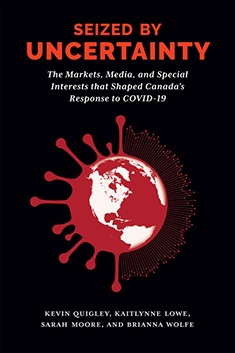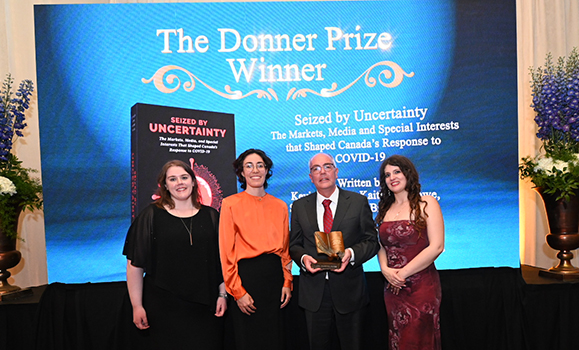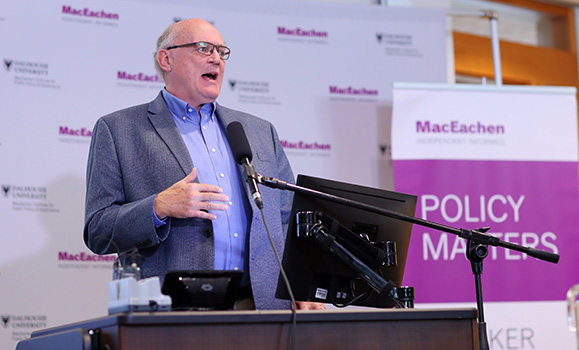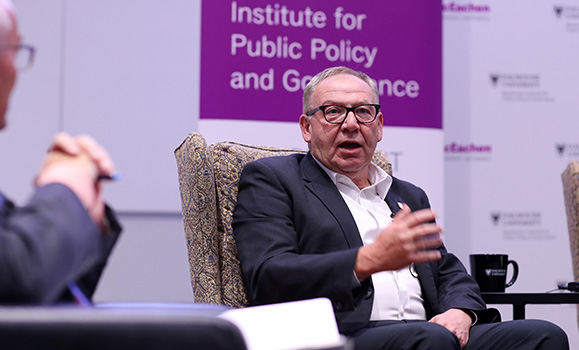As the world shut down five years ago, Dalãs MacEachen Institute for Public Policy and Governance flung its doors open, figuratively speaking ã inviting epidemiologists, health officers, economists, ethicists, and other experts in to discuss the COVID-19 pandemic and its impacts.
For Dr. Kevin Quigley, the instituteãs director and a renowned expert in risk governance and ãbig bangã events, it was just the sort of crisis the national, non-partisan policy hub he leads was well-positioned to help navigate.
ãWe knew it was a big deal. We knew this wasnãt just going to be a health problem ã it was going to be an economics problem, a security problem, a supply chain problem, a legal problem. There were so many dimensions to it,ã he says.
The institute ã established in 2015 with a $2.25 million donation in honour of Allan J. MacEachen, a prominent Cape Breton-born federal politician and architect of modern Canadian social policy ã had already built a reputation for sparking insightful cross-sector policy conversations. Its best-known efforts included its popular Policy Matters speaker series from 2017-2019, which drew standing-room only crowds and TV cameras to its on-campus talks featuring high-profile subject-matter experts.
 But the pandemic galvanized the instituteãs work in new ways. Its events looked different, with smaller roundtables and more virtual panels, yet the discussions grew more frequent and proved more urgent than ever.
But the pandemic galvanized the instituteãs work in new ways. Its events looked different, with smaller roundtables and more virtual panels, yet the discussions grew more frequent and proved more urgent than ever.
When Dr. Quigley decided to launch a book project about the pandemic with a few of his student researchers, it was the start of a five-year odyssey that culminated in celebration this week when the team ä»ã one of Canadaãs most prestigious book awards.
Seized by Uncertainty: The Markets, Media, and Special Interests That Shaped Canadaãs Response to COVID-19, co-authored by Dr. Quigley together with Kaitlynne Lowe, Brianna Wolfe, andä»Sarah Moore ã the first two Dal alumni, the last a former King's student ã explores how Canadian governments at various levels responded to the pandemic: gathering information, setting standards, and changing behaviours.

Left to right: Brianna Wolfe, Sarah Moore, Kevin Quigley and Kaitlynne Lowe receiving their Donner Prize at the award ceremony. (Donner Canadian Foundation photo)
Now, in receiving Donner Prize, Seized by Uncertainty has been recognized as the best public policy book in Canada this year, up against some heavy hitters. The Donner Canadian Foundation asä»deep dive into Canadaãs response to the COVID crisis. "The authors argue that Canadaãs response was inadequate, and that institutional inertia will prevent us from learning the right lessons from the pandemic. It delivers a clear message to policymakers that a more comprehensive understanding of risk tolerance and emergency preparedness is required to face the next pandemic."
It delivers a clear message to policymakers that a more comprehensive understanding of risk tolerance and emergency preparedness is required to face the next pandemic.
A distinctive achievement
Dalhousie has a strong history with the Donner Prize. Past Dal winners include Political Scienceãs Brian Bow (2009) and the team of Lori Turnbull, Mark Jarvis and the late Peter Aucoin (2011). Frank Harvey, another political scientist, was also shortlisted for the prize (2005). But winners and finalists are typically publications with single authors or teams of well-established academics.ä»Recognition of a scholarly work coauthored with students constitutes a distinctive collaborative achievement.
The Donner Canadian Foundation says its book finalists and winners are public policy books that "need to be read.ã
ãThatãs very powerful for me to hear that,ã says Dr. Quigley, who marshalled new funding during the pandemic to offer full-time positions to his student researchers and bring influential pandemic players together for pressing policy discussions. These events ã including one of the first pandemic-era panels featuring Atlantic Canadaãs chief public health officers in September 2020 ã helped shape the team's approach to the project.

Dr. Robert Strang, chief medical officer for Nova Scotia, at a MacEachen Institute event.
Students have been crucial to the work of the institute from its launch a decade ago, serving in several capacities as researchers, event planners, communications managers, and more. Two other students (now alumni) co-authored Dr. Quigley 2017ãs book , also a Donner finalist.
Kaitlynne Lowe, one of the researchers on the pandemic book, has been involved with the institute since it was just an idea on paper. She was one of the students on the committee that approved its creation a decade ago, there as an undergraduate representing the Faculty of Arts and Social Sciences alongside peers from the instituteãs other founding Faculties, Management and Law. (Healthä»ý¿ýå£Í Science joined later). She went on to become a part-time research assistant, eventually moving to full time during COVID.
She says an ãimmense amount of dataã was gathered for the COVID book, to which she contributed information and analysis in sections on masking, vaccines, and other topics.
ãEverything was constantly evolving and changing,ã she says. ãI got to be involved from the ideas and information-gathering stage all the way to the fruition of a publication.ã
I got to be involved from the ideas and information-gathering stage all the way to the fruition of a publication
Lowe, now working primarily as a research manager on a project at Mount Saint Vincent University, says her time with the MacEachen Institute has been ãimmenselyã helpful to her growth as a researcher.
ãThat interdisciplinary lens has really helped me in developing a big-picture approach to some really complex issues,ã she says.
Training the next generation
As with most university institutes, the MacEachen groupãs mission centres around both research and educational goals. Training the next generation of policymakers is a priority that Dr. Quigley and the instituteãs other guiding lights take seriously.
vice-chair of the government relations and communications firm and former premier of Nova Scotia, joined the institute in 2017 as honourary distinguished fellow. He has played an integral role in several of the instituteãs initiatives over the years from helping facilitate the Policy Matters series to contributing his own personal policy experiences in courses specially designed by the institute for Dal's Masters of Public Administration program.

Darrell Dexter.
Dexter says good public policy should improve peopleãs quality of life and be forward thinking, sitting above the more reactive day-to-day machinations of governments ã yet remaining adaptable.
ãPublic policy is not necessarily static. It's not like a fly stuck in amber,ã he says. ãIt's got to be able to change even if the core kind of policy stays intact.ã
He notes how MacEachen alumni have gone on to work in a vast range of roles in federal and provincial governments and beyond.
We're providing a really valuable foundation for these future policymakers
ãWeãve always sought to maximize the impact that we can have for the students,ã says Dexter, who will be joining Dr. Quigley and the co-authors at the Donner awards ceremony this Thursday. ãI think we're providing a really valuable foundation for these future policymakers so that they're literally going out into the world and able to fit kind of right into these very important positions.ã
ãI think the success of that speaks for itself,ã he adds.
Acting fast to add value
In addition to books, Dr. Quigley and his team have been committed from day one to creating actionable information quickly across a wide range of critical policy areas by publishing regular policy briefing notes they distribute widely. Theyãve tackled a huge array of topics, from climate change and emergency management to the way people with disabilities experience tourism and beyond. (You canä»find all the instituteãs research reports and briefing notesä»on its website).
Even much of the research reflected inä»Seized by Uncertaintyä»was first issued in briefing notes.
ãWeãre not waiting two years to get journal articles reviewed, and we werenãt waiting five years for a book to be published,ã says Dr. Quigley. ãI feel thatãs very important, to be focused outwardly. I say that to my staff all the time: ãWe need to be careful that weãre doing things to help people far and wide and off campus. We canãt get too insular in the work we do.ãã
As the MacEachen Institute caps off its first decade, it does so as a more influential voice than ever. Itãs not lost on Dr. Quigley how integral students have been to that success.
ãIt was a monumental task to pull all that together,ã he says. ãI simply couldnãt have done it as a single prof working in a department.ã

